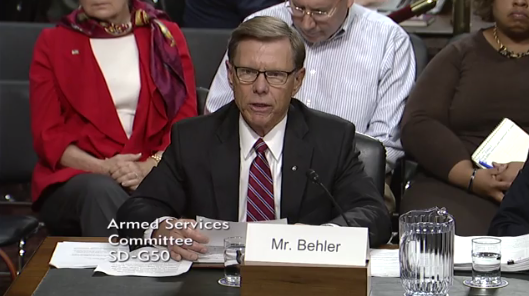
Robert Behler, who retired from the Air Force as a two-star general in 2003, testifies before the Senate Armed Services Committee on Tuesday during his nomination hearing to be the next director of operational test and evaluation. Screenshot from SASC video.
Retired USAF Maj. Gen. Robert Behler, President Donald Trump’s nominee to be the Department of Defense’s director of operational test and evaluation, sailed smoothly through his confirmation hearing before the Senate Armed Services Committee on Tuesday. SASC chairman Sen. John McCain (R-Ariz.) said the committee was likely to advance the nominations of Behler and three other DOD nominees at the next SASC hearing on Thursday.
Behler retired from the Air Force in 2003 as commander of the Air Force Command and Control and Intelligence, Reconnaissance, and Surveillance Center. He was a USAF command pilot with more than 5,000 flying hours in 65 different aircraft, including the SR-71 and U-2 reconnaissance aircraft. He is currently the chief operating officer and deputy director of Carnegie Mellon University’s Software Engineering Institute.
“I believe it is critical to accelerate the speed of acquisition for our weapons systems to continually deliver competitive advantage to our warfighters,” Behler told the committee, and he promised to be “open and transparent” with Congress in working toward that goal. “Right now, we’re risk averse,” in the DOD, he said. “It takes too long, and it costs too much” to develop new systems.
Experimentation is one of the best ways to reform acquisition, Behler said, a lesson he learned in the 1980s as commander of the 31st Test and Evaluation Squadron at Edwards AFB, Calif.
“We flew a lot of airplanes that were basically prototypes” in those days, he said. “When we do prototyping and experimentation, then we have an understanding of what the system is capable of doing.”
As a weapons system moves from prototype to program of record, Behler said the DOD has to “test early and test often.” He said it is also important to test “both in a development sense and an operational sense simultaneously.”
Behler also promised to focus on improving military software testing, which the Air Force has acknowledged is currently too slow. “Software is developing so fast,” Behler said, that “our ability to test it is lagging, our facilities to test it is lagging.”
The problem will only get worse, Behler said, because in today’s military technology, “software is the building material of choice.” Behler said his responsibility, if confirmed, would be to make sure “we have the right amount of people in DOT&E that understand the deep domain experience … of software.”
Also testifying before the committee Tuesday were Dean Winslow to be assistant secretary of defense for health affairs; Thomas Modly, to be under secretary of the Navy; and James Geurts, to be assistant secretary of the Navy for research, development, and acquisition.